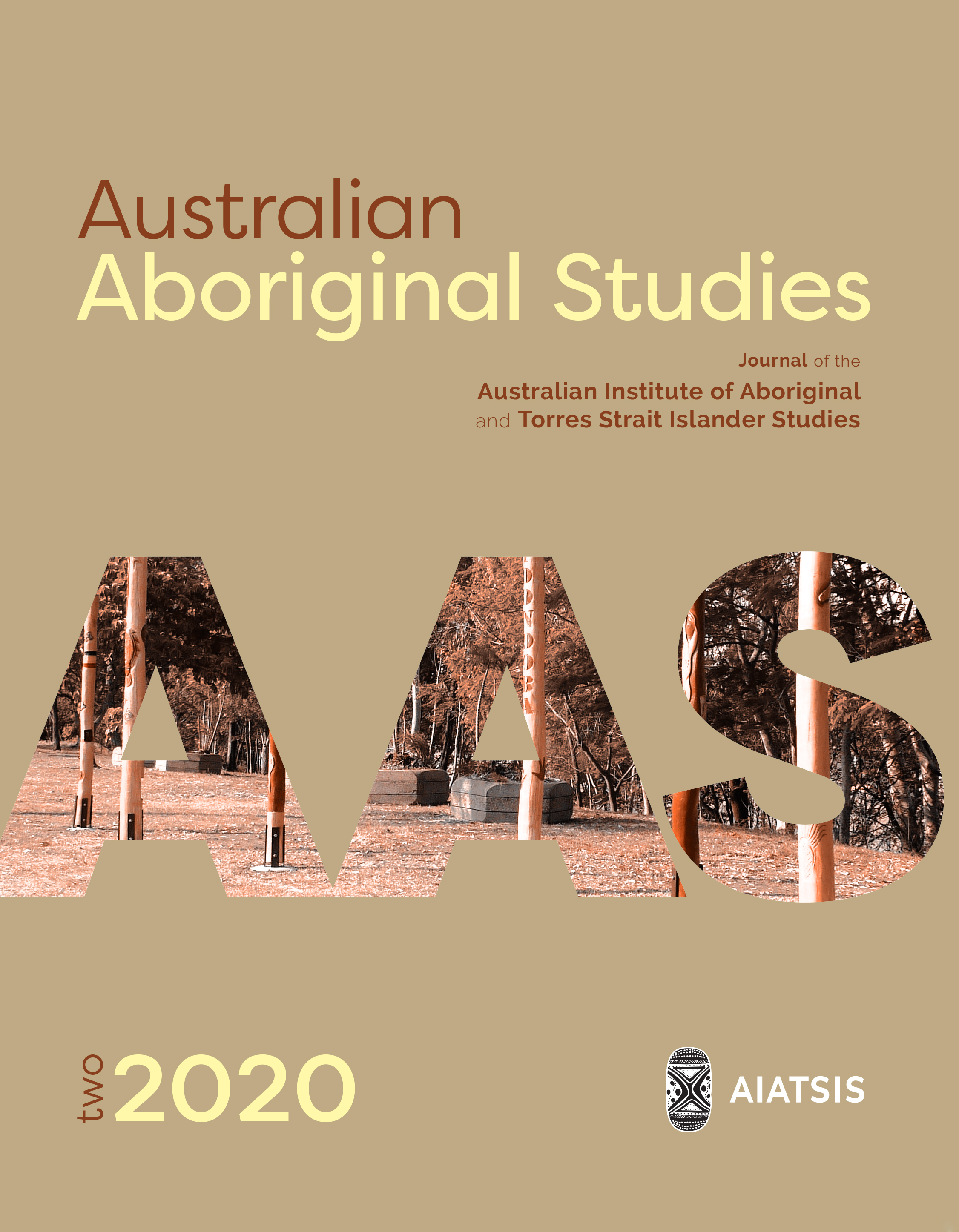Australian Aboriginal Studies: Issue 2, 2020
Editorial
Brilliant: Indigenous Genius then and now
Craig Ritchie
Commentary
Knowledge and power: the tale of Aboriginal and Torres Strait Islander data
Raymond Lovett, Jacob Prehn, Bhiamie Williamson, Bobby Maher, Vanessa Lee, Gawaian Bodkin-Andrews and Maggie Walter
Major articles
Marrathalpu mayingku ngiya kiyi. Minyawaa ngiyani yata punmalaka; wangaaypu kirrampili kara. In the beginning it was our people’s law. What makes us well; to never be sick. Cohort profile of Mayi Kuwayu: the National Study of Aboriginal and Torres Strait Islander Wellbeing
Raymond Lovett, Makayla-May Brinckley, Bronwen Phillips, Janet Chapman, Katherine A Thurber, Roxanne Jones, Emily Banks, Terry Dunbar, Anna Olsen and Mark Wenitong
Abstract: Culture is gaining increased research and policy attention as a determinant of wellbeing, following advocacy by Aboriginal and Torres Strait Islander peoples and communities. To date, the development of conceptual models and measurement tools concerning culture and wellbeing has been insufficient. Recent developments in measuring racism and trauma specific to the Aboriginal and Torres Strait Islander population highlight an interplay between culture and health. The Mayi Kuwayu Study aims to improve the understanding of the role cultural factors play in wellbeing and their interaction with standard health risk and protective factors. The study currently includes data on 9691 Aboriginal and Torres Strait Islander people, with broad representation from across Australia, and represents a nationally significant Aboriginal and Torres Strait Islander-led and owned data resource. This is the first time that novel cultural indicators, developed through extensive consultative processes, can be included in the story of what contributes to health and wellbeing in the population. Over time, the study aims to provide insights into how culture contributes to wellbeing and how oppression impedes health and wellbeing. These insights will be useful to inform health and wellbeing policy for individuals, communities and nations, in addition to governments.
Re-placing schooling in Country: Australian stories of teaching and learning for social and ecological renewal
Karulkiyalu Country, Paul Gordon, David Spillman and Ben Wilson
Abstract: In this paper, we draw on stories from Karulkiyalu Country1 to critique schooling in Australia, which we propose is contributing to ever-deepening social and ecological demise in this country. We put forward the case for a revision of unaware anthropocentrism, rampant individualism and unfettered capitalism, all primary drivers of the current Australian schooling agenda, and argue that economic prosperity and associated ‘learn to earn’ schooling agendas should never be elevated above social and ecological wellbeing. We expand ecologically upon Mackay’s (2018) social proposition that the health of the nation is reflected in and determined by the wellness of each local community. Drawing on teaching and learning processes that have been employed in Australia for tens of thousands of years, we offer an altered vision for schooling. Through the inclusion of Indigenous ways of knowing, being and doing, as story-focused, place-responsive ecocentric pedagogies, schools can reclaim their local focus on social and ecological wellbeing.
Memory poles within Toonooba: carvings of place, identity and Country along the Fitzroy River
Bronwyn Fredericks and Abraham Bradfield
Abstract: This paper discusses a public art installation in Rockhampton, Queensland, which was commissioned by the Queensland Government in 2013 to explore Rockhampton’s history of flooding and its relationship to Toonooba (the Fitzroy River). One of the three artworks, Honouring Land Connections, was developed by members of the Capricornia Arts Mob to emphasise Indigenous presence in the region and connection to Country. This paper considers how connections to Country and waterways are symbiotic, acting as the lifeblood that mediates Aboriginal relationships to person and place and informing connections to culture and identity. It highlights how the flood markers, which are memory poles made from ironbark, are manifestations of an enduring and continuing Aboriginal presence on Country. Embracing ethnographic literature on waterscapes and place, this paper explores how water blurs the boundaries between person, place and time. Water flows through Country, our bodies, space and time, connecting the past with the present and connecting lived experiences with memory. This paper proposes new habits of thought about place that transcend dominant Eurocentric perceptions. Like the memory poles in Honouring Land Connections, this paper aims to promote awareness about whose Country we reside on and the life ways of that Country.
Walking the line between academic expectations and fulfilling obligations to the mob: qualitative research processes for researching in Australian Aboriginal contexts
Sharman Okan and Jillene Harris
Abstract: Research focusing on Australian Aboriginal people has a history of imposing colonising procedures that have been disrespectful to the people themselves and that are often incompatible with the Aboriginal psyche. This paper conveys some of the lessons learned by a student and supervisor through completing a qualitative Psychology Honours dissertation. This process started with collaboration with the Anangu and Bundjalung people and included ethical approval, decisions about data analysis and the written exposition. Researcher reflexivity and the role of the supervisor are also discussed. We learned that principled engagement with Aboriginal people focuses on respecting their stories, voices and lived experiences. For us, this involved placing sovereignty and relationship at the forefront and find-ing ways to compromise on the academic requirements. The result was that the unique knowledge that was obtained was not compromised and the trusting relationships between Anangu and Bundjalung people, the university, the student and supervisor were strengthened.
Book Reviews
Mumu Mike Williams
Kulinmaya! Keep listening, everybody!
(Reviewed by Lawrence Bamblett)
John William Cary
Kangaroo and canoe: First peoples and early European Australia
(Reviewed by Philip A Clarke)
